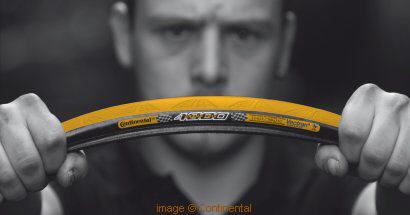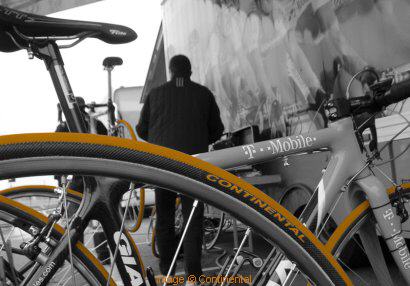If there is one thing that can transform the way bicycle rides and handles, it’s the tyres. We were fortunate enough recently to catch-up with Continental’s Head of Marketing and Sales, Jorg Malcherek, together with the man who handles the brand in the UK, Shelley Childs.

How long has Continental been making bicycle tyres?
“We’ve been manufacturing bike tyres since 1892.”
Do the bike tyres have to stand-alone as a profit unit?
“Yes, they definitely do. We have to follow the rules of the group which are that a division only survives if it is profitable.”
How many tyres per year do you manufacture?
“Ah! We don’t talk about that, it’s not really a topic for anybody else. Our competitors give out figures but they are just bullshit to upset people.”
How important is pro bike racing to your marketing effort?
“Well, up until July it was very important! (the Ulrich affair). It is our intention to continue with sponsoring teams in the pro ranks, but we also plan to back ‘local heroes’: in other words good, regional amateur teams. Actually, we have always done this, but now we intend to promote it more.”
Did Ulrich’s exclusion from the Tour have any influence on your attitude to sponsoring pro teams?
“That’s not an easy question to answer. I don’t think that there is any sport which is totally ‘clean’, but yes, it’s very important that we are involved with a sport which is not tainted. We do get lots of support from other divisions of Continental, primarily the motor vehicle tyres, and they obviously don’t want to be involved in a sport with a negative image.”
Will Continental continue to manufacture road tubulars?
“Always.’ Tubs’ rule with the pro teams. We meet with the European team mechanics regularly and the tubular is still very popular. Also, remember that the new generation of carbon rims are all made only for tubulars.”
What is Continental’s ‘unique selling proposition’ — why buy a Continental tyres and not any other brand?
“The main factor would be research and development. There are around 30 brands of tyre on the market, but only three or four actual manufacturers! We have close associations with the chemists who develop Continental’s motor vehicle compounds, and we benefit from all that research and technology.”
Do you still recommend maturing tubulars like we did in the “old days”?
“No, that’s bollocks! We have had meetings with the team mechanics to explain to them that it’s not necessary any more, the vulcanising technology is so much better now.”

What became of the ‘tuning liquid’ we saw used on Continental tyres by T-Mobile at the L’Alpe D’Huez mountain time trial a year ago to cut-down rolling resistance?
“It works very well, but it can only be used in the dry. We released it to the teams with detailed instructions, however they ended up using it in the wet, so of course there were crashes. We withdrew it and it can only be applied by us now. If there was a specific, important application then it’s available for teams.”
What does the future hold? Tubeless? Lighter? Puncture-proof?
“Tubeless technology has been available for two years but the market, with the exception of downhill, just doesn’t seem to want it. Even in downhill many run with inner-tubes. It has been a lot less popular than we expected.
“As for lightness, it’s inevitable that new materials will come along. For example, Vectran is a good material but it’s very expensive. It’s like Formula One, where it’s the last few horsepower that cost all the money; on tyres it’s those last few little grams that cost. We’ve found that Vectran is the best material for puncture-resistance too.
“Talking about Kevlar is just marketing hype, it’s far too stiff to use in tyres. Nylon is better, but Vectran is best.”
VeloVeritas would like to thank Jorg and Shelley for their time, and look forward to previewing some new tyre technology in 2007.



